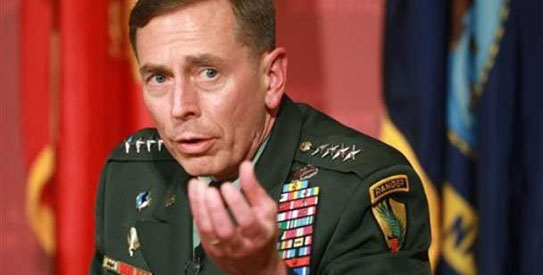
WASHINGTON: The United States has increased pressure on Pakistan to take immediate military action against the Haqqani network, using a series of meetings between military and civilian leaders of the two countries to convey the message, diplomatic sources told Dawn.
The ISI chief, Gen Shuja Pasha, who left Washington for home on Tuesday night after a meeting with Gen David Petraeus, is believed to have heard directly from the CIA chief that the US wanted an immediate military operation against the network.
Gen Pasha also met another senior Obama administration official before leaving for home but both sides are declining to disclose the official’s name.
“Yes, we heard their point of view but it does not mean that we are going to launch an operation tomorrow,” said a senior Pakistani official aware of the proceedings of these meetings.
“The Haqqani network was one of the subjects the two sides focused on but other issues were discussed as well,” the official added. “Intelligence-sharing, militant activities across both borders and better border-control were other key points.”
While the US focuses on the militants who cross the Afghan border to attack coalition forces in Afghanistan, Pakistan says the Taliban are also crossing over into its territory, killing dozens of Pakistani troops and civilians.
The US media, however, reported that the Americans also raised their demand for an immediate military action against the Haqqani network at a meeting between US military chief Admiral Mike Mullen and Pakistan army chief Gen Ashfaq Parvez Kayani in Madrid last week.
The American Forces Press Service reported on Wednesday that while not yet willing to blame the Haqqani network for assassinating the former Afghan president, Burhanuddin Rabbani, Pentagon leaders have emphasised that they will continue to pressure Pakistan to keep insurgents there from spilling into Afghanistan.
“Our biggest concern right now is to put as much pressure as possible on the Pakistanis to exercise control from their side of the border,” US Defence Secretary Leon E. Panetta said during a Pentagon news briefing with Admiral Mullen.
“We have continued to state that this cannot happen. We cannot have the Haqqanis coming across the border attacking our forces and [Afghans] and disappearing back into a safe haven,” the US defence secretary said. “That is not tolerable, and we have urged them to take steps.”
Mr Panetta declined to discuss specific strategies, including whether the United States would consider unilateral action. He did say, however, “We are going to take whatever steps are necessary to protect our forces”.
It’s in the best interest of the Pakistanis to deal with terrorists within their borders, he said.
“Frankly, terrorism is as much a threat for them as it is for us,” he said. “And we keep telling them you can’t choose among terrorists. If you are against terrorism, you have to be against all forms of terrorism. And that is something we just have to continue to stress.”
Admiral Mullen said he had made clear during his meeting last week with Gen Kayani that Pakistan needed to do more. Among issues he raised were the Haqqanis’ proxy ties to Pakistan’s Inter-Service Intelligence agency and their role in killing coalition troops and Afghans in Afghanistan.
“It was the heart of the discussion,” Admiral Mullen added, emphasising that this activity “has to stop”.
“That is not a new message, but it is one that (Gen Kayani) clearly understands,” Admiral Mullen said. “And I think it is one we have to keep reiterating.”
Admiral Mullen credited the strong relationship he and Gen Kayani had built with helping them work through difficult periods between their two countries. “It is going to go up and down,” he said of the US-Pakistan relationship. “We have had a very tough patch here over the last several months.”
Based on current information, Admiral Mullen said he could not confirm that the Haqqanis were behind the death of Prof Rabbani, the senior Afghan official in charge of negotiating with the Taliban.
Secretary Panetta called the killing of Prof Rabbani a blow to the reconciliation and reintegration process in Afghanistan.
“I regret his loss. I think he was playing an important role,” Mr Panetta said. “I am hopeful that we will be able to work with others to try to continue the efforts that he was engaged in.”
The assassination was among other recent high-profile attacks that Admiral Mullen said reflect an apparent shift in the Taliban’s overall strategy.
“They have not succeeded on the ground this year. Their campaign has failed in that regard,” he said, causing them to resort to high-profile attacks.
Admiral Mullen acknowledged, however, that such attacks had strategic significance.
“So we take it very seriously as a part of the campaign,” he said. “We know that this is what the Taliban is doing, and we have got to adjust and we are doing that.”
Secretary Panetta said the coalition was working with the Afghans to discuss ways to better protect against future attacks. But the Taliban’s change of strategy, he added, showed that its leaders realised they were losing ground in Afghanistan.
“The bottom line still remains that that we are moving in the right direction,” he said. “We have made progress against the Taliban, but we can’t let some of these sporadic events deter us from the progress that we are making.”











































Dear visitor, the comments section is undergoing an overhaul and will return soon.